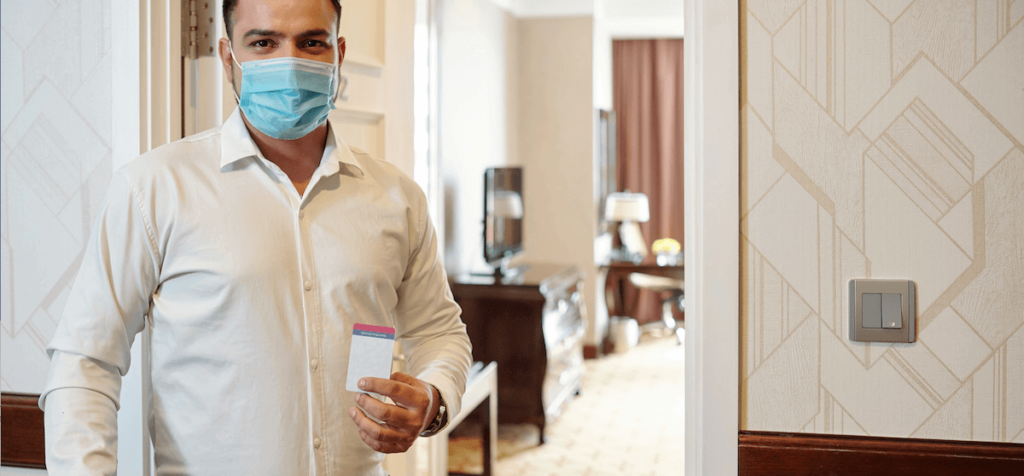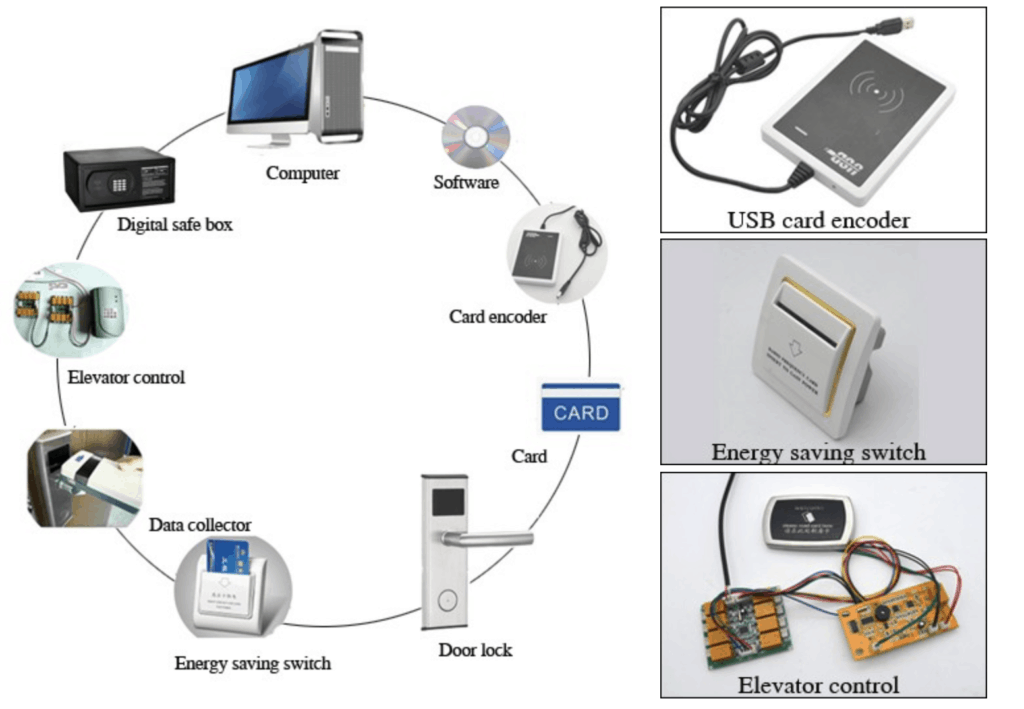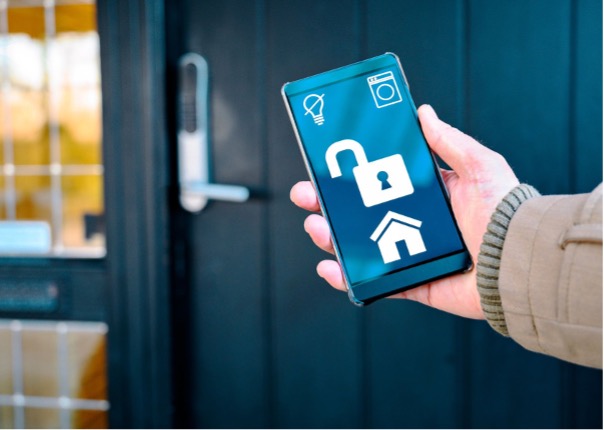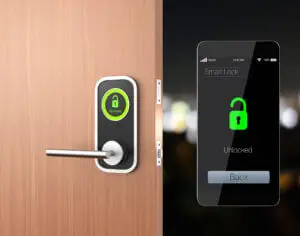Ensuring the safety and security of hotel guests is a top priority for every hotel management team.
RFID (Radio Frequency Identification) technology has revolutionized the hospitality industry in recent years by integrating access control, guest services, inventory management, asset tracking, and financial transactions under one platform.
RFID-enabled ID cards that serve as room keys have made access to hotels more secure and convenient while minimizing maintenance costs. These RFID cards also come with RFID wristbands that are compatible with a specific RFID reader.
However, many people are still unaware of what RFID software solutions are all about. Therefore, this guide will answer some of the most frequently asked questions regarding such systems for hotels.
What is an RFID system?
An RFID system consists of an antenna connected to an electronic tag that holds data in its memory. When the tag comes within range of the antenna’s magnetic field, it activates a transmitter that sends data back to the reader.
How do RFID systems work?
RFID systems use electromagnetic fields instead of traditional barcodes to transfer information from a tag to a reader. They comprise three components: tags or transponders, a read/write device or interrogator/reader, and application software.
Why do hotels need an RFID system?
Hotels require advanced technologies like RFID systems to improve the guest experience while ensuring their safety and security through convenient keyless entry and monitoring capabilities for every room.
Here are some specific ways in which hotels can benefit from an RFID system:
- Keyless room entry: With RFID-enabled room keys, guests can enter their rooms quickly and easily without having to fumble with traditional keys or swipe cards. This not only saves time but also enhances security, as the keys are difficult to duplicate.
- Inventory management: RFID tags can be attached to hotel linens, towels, and other supplies, allowing staff to track inventory levels more accurately and efficiently.
- Access control: RFID technology can be used to restrict access to certain areas of the hotel, such as employee-only areas or storage rooms, improving security and reducing the risk of theft or unauthorized access.
- Personalization: RFID-enabled bracelets or cards can be given to guests, allowing them to access personalized services such as spa treatments, restaurant reservations, and other amenities. This enhances the guest experience and can lead to increased customer loyalty.
- Energy efficiency: RFID systems can be used to control lighting, heating, and air conditioning in hotel rooms, helping to conserve energy and reduce costs.
Overall, an RFID system can help hotels improve their operational efficiency, enhance guest experiences, and increase security, making it a valuable investment for many properties.

What benefits can these systems provide?
RFID technology offers several advantages, which include efficiency in operations management by using real-time data capture throughout your establishment with no human intervention needed.
It provides improved security by allowing only authorized personnel inside certain areas. Moreover, it offers increased productivity as staff members can focus on more important tasks without being bogged down by manual processes and reduced operational costs as there is no physical wear-and-tear damage caused by traditional keycards.
What Is The Cost Of Implementing Such A System To Run An Effective Hotel Business Operation?
The cost of implementing an RFID system varies significantly depending on the scale of your business operation, but it can be estimated to range between $1,500 to $5,000 per door.
This cost includes the necessary hardware and software components needed to facilitate efficient in-room access control.
What is the lifespan of an RFID tag?
The lifespan of an RFID tag depends on various factors, such as the type of tag, the environment it is used in, and the frequency of use. Generally, RFID tags are designed to last for several years and can have a lifespan ranging from a few years to over a decade.
Passive RFID tags, which do not have an internal power source, can last up to 20 years or more if they are not exposed to extreme environmental conditions such as high temperatures or moisture. However, if the tag is used in harsh environments or undergoes frequent read/write cycles, its lifespan may be significantly reduced.
Active RFID tags, which have an internal power source, typically have a shorter lifespan than passive tags due to the limited battery life. The battery life of an active tag can range from a few months to several years, depending on the type of battery and the frequency of use.
It is important to note that the lifespan of an RFID tag is not the same as its read range, which can be affected by various factors such as interference, tag orientation, and reader power. Additionally, some RFID tags may have a limited number of read/write cycles, after which they may need to be replaced.
Overall, the lifespan of an RFID tag can vary depending on several factors and should be evaluated based on the specific use case and environmental conditions in which it will be used.

Are RFID systems less expensive than traditional keycard systems?
Yes, they are. Whilst traditional keycards require frequent replacement due to wear-and-tear damage over time, RFID tags are designed to last longer and require less maintenance. This can potentially save hotel owners money in the long run.
Can RFID tags be reprogrammed?
Yes, RFID tags can be reprogrammed with new information as needed, making them a flexible and scalable solution for hotel operations.
What happens if an RFID tag is lost or stolen?
If an RFID tag is lost or stolen, it can easily be deactivated by the hotel’s management team to prevent unauthorized access to rooms or other areas of the establishment.
And through the hotel door lock management software, the hotel manager can issue the room without the card to make it invalid. And then issue a new room card for the certain room.
In a word, an RFID tag lost or stolen or broken, won’t influence the door lock opening and hotel management.
How secure are RFID systems?
RFID systems offer a high level of security through encrypted data transmission and authentication technology that verifies the identity of each tag holder.
The risk of counterfeit or cloned RFID key cards is minimal, as each card contains unique identifying information that cannot easily be duplicated or altered by unauthorized parties. It is highly important in inventory tracking.
Can multiple applications use one RFID system?
Yes, multiple applications can leverage the same RFID infrastructure within a hotel environment allowing for more efficient management, greater automation, and data collection capabilities.

Can staff members also use their ID cards for payment processing?
Yes! In addition to room access control, many hotels utilize their RFID systems to enable cashless transactions throughout hotel amenities such as restaurants and spa services which enhance user experience while reducing physical contact points that could potentially spread germs.
What’s the main advantage an extension of your existing PMS software with RFIT functionality brings along?
PMS (Property Management System) integration with your existing RFID hardware allows you to benefit from having real-time data capture without needing manual intervention.
Thereby it helps increase efficiency throughout your property, leading to faster available turn-around times on occupancies while achieving insights about guest behaviors and enabling staff to anticipate guests’ requests even before they’re made, leading to delighted users every time.
What happens if there is a power outage or system failure?
Most RFID systems have backup batteries to ensure uninterrupted operation during power outages. Additionally, many systems have redundancy built in to minimize potential downtime in case of a hardware or software-related issue.
Can guests use their smartphones as room keys with an RFID system?
Yes, many hotel brands now offer mobile key functionality via their smartphone apps that utilize RFID technology as a means of enabling door access control from the device itself.

Are there any privacy concerns with RFID systems?
While RFID tags can store personal information such as guest name and room number, this data is typically encrypted and requires authentication before access is granted.
However, hotels should be transparent with guests regarding how their data is being used and should take necessary measures to protect their information from unauthorized access.
Can older buildings be retrofitted with an RFID system?
Yes, older buildings can typically be retrofitted with an RFID system without significant structural changes depending on the specific layout and architecture involved.
In most instances utilizing existing electrical designs that can facilitate placement where required while supporting automation processes identified through discovery and scope adequacy.

How long does it take to install an RFID system in a hotel?
The time it takes to install an RFID system depends on the size of the property being outfitted. Some of the establishing factors include hardware requirements, ease-of-installation needs for each component, along other specifics unique from the project-to-project basis.
It may impact installation timelines, which could vary between days to several weeks. It allows adequate testing periods.
Moreover, oftentimes end-to-end testing would need at least 72 hours after finishing installation steps to evaluate its intent against achieving maximum optimization within your environment’s physical infrastructure.
Conclusion
Implementing an RFID system in hotels provides numerous benefits, such as increased guest safety, brand loyalty, guest rooms, and convenience, while reducing operating costs through efficient management techniques supporting sustainable operations throughout one’s portfolio.
Ultimately improving guest satisfaction and hotel profitability while mitigating environmental stressors associated with keycard wear-and-tear, event turnover, and many other issues.






